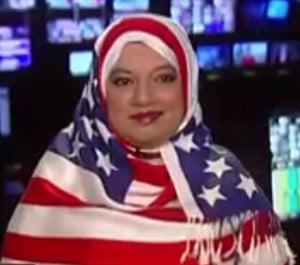“Love Marriage and Fairytales” is a somewhat misleading title to a popular Muslim Youtube video, trending in various social media circles, having gone “Muslim-viral,” as my fellow MMW contributor Sana Saeed calls it. This video (according to information discerned from the Youtube account) is an attempt to highlight the most frequent and problematic issues facing marriages today while also pointing towards Allah as the ultimate healer, redeemer and restorer of every marriage. Unfortunately, however, despite the positive message it conveys, the video comes across in part as a thinly veiled attempt to advocate women’s modesty (i.e. adorning the hijab) and the gender segregation as the primary solutions to many of the social problems facing Islamic communities today.
The video features a male narrator, with a beard and a cap, with swagger, who gently raps out a catchy poem (lyrics transcribed in full at the end of this post) about chastity, purity, and finding spirituality (Allah) as a precursor towards finding a marriageable companion. It would be remiss of me not to mention a couple of lyrics that really struck a chord and highlight what I consider are positive intentions of the video itself:
So be kind to her, and know that Allah will be kinder.
Be a man who stands in front but also a man who stands beside her.
And if you’re still looking for that good girl, don’t go chasing after behind her.
Rather search to find Allah first.
For once you find him, guaranteed to find her.
The video begins by addressing the increasing lack of spirituality (faith in Allah SWT) in today’s highly globalized society:
See our minds have become messed up and are (now) filled with pollution.
TV screens and magazines, we’re beginning to look for a solution.
Plastic surgery, diet and pills, still not seeing any form of improvement.
We’ve stacked up all these dollar bills, still not sure what to do with them.
He then proceeds to address how this lack of faith or spirituality impacts relationships:
We began to chase women and fornication to the point our girls don’t even know whose baby she’s carrying.
We’re so afraid of commitment, but have no problem with damaging.
She has your kids now, but you’re still not even contemplating the possibility of marrying.
I actually appreciate the last line about taking responsibility for your actions (consider marrying your baby mama), which is clearly directed at men.
This is where he introduces Mary and suggests that these mistakes result from not following in the traditions of great role models like Hazrat Maryam (AS) and observe the piety, chastity, and gender segregation practices demonstrated by this great individual as the mother of Hazrat Isa (AS). Additionally, he makes references to women’s dress code in the following lines:
But anyways today, we’re taught to be against segregation, before in support of all forms of liberation.
To free yourself from the clothes that only lead to your degradation.
And
I mean just look at the simplistic way we’re taught to dress, it’s like if you dress less, then you’re destined for success.
You then force your women into heels, and have the nerve to say that we oppress?
You got her to dress up tightly, like it’s an opportunity.
He references women’s fashion in the West as both objectifying and degrading, which, he claims, is easily remedied with the hijab and or modest clothing. These particular lyrics are examples of how the discourse on modesty particularly in relation to the hijab and how it relates to women’s virtuosity and goodness of character is consistently dictated by men. While it is true that designers create ill-fitting contraptions for women to wear often better suited for 6-foot frames and that advertisers pass off skimpiness as a woman’s strength and confidence, the real source of a woman’s strength and character should not be measured by the clothes she wears but by the manner in which she is able to maneuver through the challenges of life with His guidance and mercy. Clothes, whether a hijab or a body-defining suit, are not the whole story, and politicizing the issue of the hijab only takes away from a women’s right to make choices about her private person.
A recent, personal incident further highlights how the discussion of “what women should wear” is decided by men. At a local bank in Islamabad, I was confronted by an older gentleman who proceeded to praise me for my abaya- and hijab- wearing ways. He compared my state of dress with that of a teenager sitting across from me; someone he felt looked vulgar with her long top and skinny jeans and a head full of gorgeous curly hair. I sat through his diatribe, in part stunned and confused – where does he get off saying this to me? I wear abayas on occasion for reasons that are personal and entirely my own. To have someone (and a man no less) praise me for my supposedly, religiously correct choices is both insulting and condescending. Annoyed at the man’s intrusion and judgment, I quickly left the bank. Here I am, being judged for wearing a hijab; ironically, while my intention is to not draw attention to myself, my attire (black, billowy abaya, no makeup and flats) still triggers unnecessary interest. It only underscores the idea that women garner respect and identity based on the extent to which they hide their physical attributes. The woman as an individual is ignored and like in the video, those around her will judge her (negatively most likely) if she does not (for whatever reason) abide by such terms.
What continues to surprise is why men insist so heavily on modest clothing as the answer to all that ails Muslim communities in this globalized era? In actuality, while the focus of the video appears to be the issues facing marriages, this reference to modesty and women’s hijab does not necessarily contribute to the overall discussion, or in other words, donning of the headscarf does not address the most frequent and problematic issues facing marriages today, hence the inaccurate title of the video. My fellow MMW contributor Nicole, in a recent post, also questions the role of hijab as the primary indicator of a Muslim woman’s Islamicness and why someone’s else’s opinion about our worth as Muslimahs is more important than the truths we hold dear to ourselves as human beings. More importantly, why aren’t our choices about our levels of modesty our own to begin with? I think Krista best summed it up in an email to MMW contributors on the contents of this recent video: “I think we should really be able to just declare a moratorium on men (and everyone else, but men in particular) talking about what women should be wearing.”
Love Marriage and Fairytales (rough transcript of lyrics)
See our minds have become messed up and are (now) filled with pollution.
TV screens and magazines, we’re beginning to look for a solution.
Plastic surgery, diet and pills, still not seeing any form of improvement.
We’ve stacked up all these dollar bills, still not sure what to do with them.
We began to chase women and fornication to the point our girls don’t even know whose baby she’s carrying.
We’re so afraid of commitment, but have no problem with damaging.
She has your kids now, but you’re still not even contemplating the possibility of marrying.
See this is what happens when we neglected Allah’s best examples…
You called her Mary, we called her Maryam.
A woman who’s perfect since birth.
The best to walk the skies and best to walk the surfaces of earth.
The most exalted of all women.
That’s why she was dedicated an entire chapter in the Holy Quran, the final revelation and which’ll be none after.
She was the best of all women and to society she should be leading the way.
I mean that’s why our women be dressing like her, because just like Mary, when Allah decrees something, we hear and we obey.
See Mary, used to cover up, and despite everything they used to say, she would hide in hibernation and to Allah she would pray.
And when she was visited by angels in the form of men, she said if you fear Allah, you would go away because in the presence of men, she would not stay.
But anyways today, we’re taught to be against segregation, before in support of all forms of liberation.
To free yourself from the clothes that only lead to your degradation.
Why you gotta cover your face for? We gotta see your identification!
But little do they know her identity is right there.
A woman who fears Allah and commits to her religious obligations.
See, I respect all women too because that is what my religion teaches.
To lower your gaze while you’re walking, there’s no need to check out every second woman’s features.
There’s no need to even shake another woman’s hand, because in reality, there’s only one reason why a guy will be pleased to meetcha.
And you can go ahead and deny it, but don’t blame me for stating the obvious.
When the pornographic industry is worth billions, you still don’t see where the problem is?
Sex is embedded in(to) society to the point will exploit it to merely sell a car.
So you can act like this is all new to you, but you know for a fact just how innocent we really are.
I mean just look at the simplistic way we’re taught to dress, it’s like if you dress less, then you’re destined for success.
You then force your women into heels, and have the nerve to say that we oppress?
You got her to dress up tightly, like it’s an opportunity.
But every time we lose our minds it’s like, see what these ladies do to me?
But I’m not blaming it (all?) on the women because, we too have a responsibility.
Prophet Muhammad (PBUH) said the best of men is he who is best in his character.
And the best of them who is best to his lady…after he married her.
He was best to his wives, just take a look at Ayesha.
He’d compete with her in races, just to make her happier.
So when you do marry, do so with the intention of paradise, is where you plan to carry her.
But before you plan to carry her to the altar, maybe you should (alter?) your decision.
Cuz If the only reason you’re marrying her is for the outside, then realize you’re gonna be locked inside of a prison.
For that reason, Prophet Muhammad (PBUH) said marry for four: beauty, family, status but most importantly her religion.
Because a woman without religion is a woman who could do with a bit of extra wisdom.
We’re meant to grow old together, mercifully, so we can be protected under Allah’s supervision.
But relationships are a mess and there’s no guarantees you’re gonna be a survivor.
So be kind to her, and know that Allah will be kinder.
Be a man who stands in front but also a man who stands beside her.
And if you’re still looking for that good girl, don’t go chasing after behind her.
Rather search to find Allah first.
For once you find him, guaranteed to find her.












